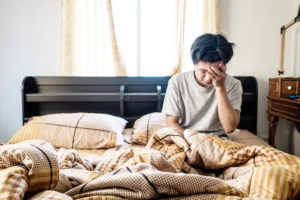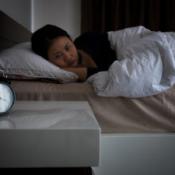 I can’t tell you how often people in therapy tell me they struggle with a good night’s sleep. They might have trouble falling or staying asleep. I get it. I’ve had times in my life when the thought of trying to sleep gave me incredible anxiety because I was sure it wouldn’t be easy.
I can’t tell you how often people in therapy tell me they struggle with a good night’s sleep. They might have trouble falling or staying asleep. I get it. I’ve had times in my life when the thought of trying to sleep gave me incredible anxiety because I was sure it wouldn’t be easy.
Struggling with sleep once in a while isn’t that big of a deal. However, if you don’t sleep well night after night, the sleeplessness creates undue stress on your brain and body.
Why Is Sleep So Important?
An article on the Johns Hopkins Medicine website explains that, “If we sleep too little, we become unable to process what we’ve learned during the day and we have more trouble remembering it in the future.” So sleep affects how we store memory. If you’re having difficulty remembering things because you’re not sleeping enough, then it can be hard to stay on task, focus, and feel on top of your life.
A lack of quality sleep can affect your physical health and your immune system as well. Sleep deprivation may make you more prone to getting sick or staying sick longer.
Poor sleep quality can also negatively impact mental health. A good night’s sleep can help promote your natural resilience. That’s the quality that helps your mind and body bounce back from bad experiences. According to the Anxiety and Depression Association of America, if you rarely get enough sleep, you could develop an anxiety condition.
A recent study looked at sleep and anxiety. It compared people who don’t get the recommended eight hours of sleep per night with those who slept eight hours or more per night. The study found people who slept less were more likely to focus on and linger over negative thoughts — much like people who struggle with anxiety and depression. Constant negative thinking can leave you feeling unhappy, stressed, and anxious.
One of the first things I ask people in therapy is, “How much sleep do you get each night?” That’s because I know that getting sleep patterns back on track can make a HUGE difference in managing anxiety. When your body doesn’t have the opportunity to relax during a good night’s sleep, you start the day already stressed. In contrast, after a good night’s sleep you get to start from a good place every day. Sleep gives your brain and body the rest they need to work properly.
9 Steps To Help You Sleep Better
- Go to bed at the same time each night. When you do, you’re training your body to recognize that it’s time to get ready for sleep.
- Turn off electronics at least a half hour before bed. Studies show that electronic devices, even TV, stimulate your brain. Turning off all your devices before you get into bed gives you a chance to relax so you can fall asleep more easily.
- Create a simple bedtime routine. Your routine could include brushing your teeth, washing your face, turning down the covers or meditating. The key is to be consistent. Give your body signals that sleep is coming soon.
- Sleep in a cool, dark room. Coolness and darkness help you fall sleep and stay asleep.
- If you can’t sleep after 15 minutes, get up. Getting up might feel like the opposite of what you’re trying to do. That’s OK. Lying in bed and trying to force yourself to sleep can make you feel more anxious. Then it’s impossible to fall asleep. Get out of bed, make yourself a cup of herbal tea or hot milk, read, meditate, or listen to soothing music. Don’t automatically look at your phone or the TV. When you feel sleepy again, go back to bed and try again.
- Only use your bed for sleeping. Don’t watch TV or work in your bedroom. You want your brain to connect the bedroom with sleep, so it knows that when you’re in that room, it’s time to sleep.
- Reduce caffeine intake. Limit how much caffeine you drink or eat each day. Be aware that some food and drinks have caffeine and you might not know it. If possible, don’t drink caffeinated beverages or eat food with caffeine after 12 o’clock noon.
- Try not to nap, even if you had a poor night’s sleep. Napping for more than 30 minutes messes up your natural sleep cycles. A half-hour nap can recharge and refresh you without confusing your body.
- Be consistent. It’s important to follow the same routines each night so your body and mind get trained to start preparing for sleep.
It can take time and practice to retrain your brain and body, especially if you haven’t tried this before. Be patient and compassionate when sleep doesn’t come.
If you’ve tried these strategies and you’re still struggling with sleep every night, you may want to talk to your primary care physician to see if you have any underlying health conditions. A trained therapist can also help with anxiety or sleep issues.
References:
- People who sleep less than 8 hours a night more likely to suffer from depression, anxiety. (2018, January 4). ScienceDaily. Retrieved from www.sciencedaily.com/releases/2018/01/180104152947.htm
- The science of sleep: Understanding what happens when you sleep. (n.d.) Johns Hopkins Medicine. Retrieved from https://www.hopkinsmedicine.org/health/healthy-sleep/sleep-science/the-science-of-sleep-understanding-what-happens-when-you-sleep
- Sleep and mental health: Sleep deprivation can affect your mental health. (2018, June 19). Harvard Medical School. Retrieved from https://www.health.harvard.edu/newsletter_article/sleep-and-mental-health
- Sleep hygiene. (n.d.) American Sleep Association. Retrieved from https://www.sleepassociation.org/about-sleep/sleep-hygiene-tips
- Understanding the facts: Sleep disorders. (n.d.) Anxiety and Depression Association of America. Retrieved from https://adaa.org/understanding-anxiety/related-illnesses/sleep-disorders
© Copyright 2018 GoodTherapy.org. All rights reserved.
The preceding article was solely written by the author named above. Any views and opinions expressed are not necessarily shared by GoodTherapy.org. Questions or concerns about the preceding article can be directed to the author or posted as a comment below.

 Want to Manage Anxiety Naturally? Here Are 9 Ways to Begin
Want to Manage Anxiety Naturally? Here Are 9 Ways to Begin Identifying and Addressing the Root Causes of Your Sleep Problems
Identifying and Addressing the Root Causes of Your Sleep Problems How Leaning Into Your Anxiety Can Help You Manage It
How Leaning Into Your Anxiety Can Help You Manage It